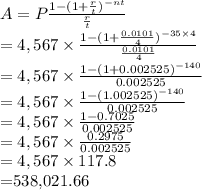
Mathematics, 28.10.2019 13:31 andy2461
Seth has a bank account which pays 1.01% interest, compounded quarterly. seth withdraws $4,567 from the account every quarter for 35 years. assuming that seth does not make any deposits into this account and that the withdrawals occur at the end of every quarter, find the initial value of the account, rounded to the nearest cent.
a.
$765,824.68
b.
$767,758.39
c.
$538,021.66
d.
$539,380.16
select the best answer from the choices provided
a
b
c
d

Answers: 2


Another question on Mathematics


Mathematics, 21.06.2019 21:00
Oliver read for 450 minutes this month his goal was to read for 10% more minutes next month if all of her medicine go how many minutes will you read all during the next two months
Answers: 3

Mathematics, 21.06.2019 23:50
Which statement explains how you could use coordinate geometry to prove the opposite sides of a quadrilateral are congruent? a. use the slope formula to prove the slopes of the opposite sides are the same. b. use the slope formula to prove the slopes of the opposite sides are opposite reciprocals. c. use the distance formula to prove the lengths of the opposite sides are the same. d. use the distance formula to prove the midpoints of the opposite sides are the same.
Answers: 3

Mathematics, 22.06.2019 00:00
What is the measure of each of the two angles formed by the bisector of the diagonal of a rhombus if the original angle measures 58 degrees?
Answers: 1
You know the right answer?
Seth has a bank account which pays 1.01% interest, compounded quarterly. seth withdraws $4,567 from...
Questions

Mathematics, 03.12.2020 02:40

Mathematics, 03.12.2020 02:40

Mathematics, 03.12.2020 02:40



Mathematics, 03.12.2020 02:40

Spanish, 03.12.2020 02:40




Chemistry, 03.12.2020 02:40

Mathematics, 03.12.2020 02:40

History, 03.12.2020 02:40


History, 03.12.2020 02:40

Mathematics, 03.12.2020 02:40

Mathematics, 03.12.2020 02:40


Social Studies, 03.12.2020 02:40

 ; where A is the initial value, P is the periodic withdrawal, r is the rate, t is the number of compounding in a year, n is the number of years.
; where A is the initial value, P is the periodic withdrawal, r is the rate, t is the number of compounding in a year, n is the number of years.


